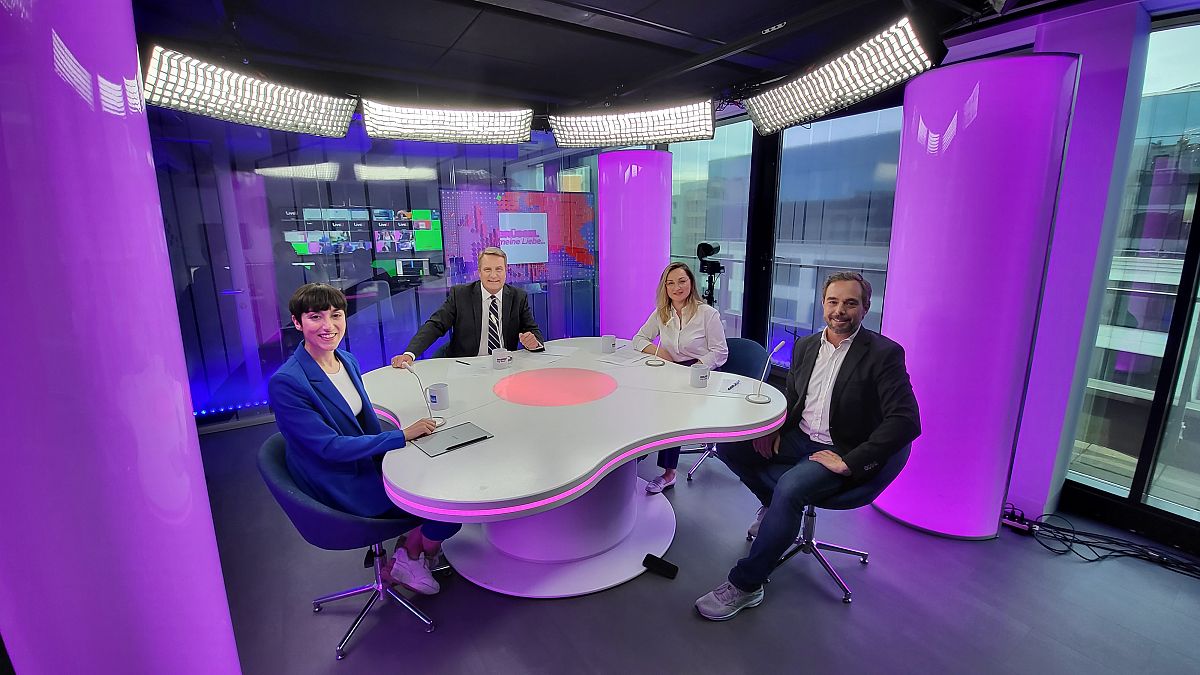Brussels, my love? The struggle to fill the EU top jobs

In this edition of our weekly talkshow, participants discuss the ongoing talks about the appointments for the EU top jobs, the election campaign in France and football as a unifying factor.
The post-election game of horse-trading went into overtime this week. Despite early optimism by many participants, the informal EU Council failed to appoint the candidates for the bloc’s top jobs. There is reportedly no resistance to Ursula von der Leyen, Antonio Costa and Kaja Kallas, but the rest of the food fight was as nasty as ever. Who is to blame here?
Questions for our guests Maria Rodriguez Alcazar, president of the European Youth Forum, Teona Lavrelashvili, political scientist and senior fellow at Catholic University in Leuven and Ricardo Borges de Castro, European and Global Affairs specialist at the College of Europe in Bruges.
What was supposed to be a fast track procedure, turned out to be another act of high drama: the line-up of EU top jobs. An informal summit in Brussels struggled in vain until midnight to confirm the appointments. And this despite no serious opposition to the candidates. Yet, the European People’s Party and Italy’s far-right government, both election winners, wanted a bigger share of the power pie. Result: Von der Leyen, Costa and Kallas need to be patient until at least the upcoming regular summit meeting next week. Too bad – this combination seems to be the perfect compromise in terms of political affiliation, geography and gender balance – or not
There might not have been any opposition to the top job trio, which was confirmed by several summit participants. But publicly, none of the candidates were without fault.
Ursula von der Leyen has not been uncontroversial. There are still lingering investigations into “Pfizergate” and an alleged wrongdoing of hers over vaccine contracts.
She also received blistering criticism for her one-sided approach of the Israel-Hamas war and was criticised for a migration deal with Tunisia that left human rights groups still fuming.
Antonio Costa started out as a successful prime minister of Portugal, until police raided his official residence as part of a corruption investigation.
Costa has not been found guilty of anything, but his move from Lisbon to Brussels is seen by some as tasteless and water on the mills of anti-EU populists.
Kaja Kallas, finally, faced heat amid a probe of her husband’s business ties to Russia. She survived this political scandal, but her staunch pro-Ukraine position raised doubts about her impartiality and open-mindedness deemed necessary for the EU’s top diplomat.
The second topic was the political uncertainty, even anxiety, the outcome of the European elections has plunged France into. President Emmanuel Macron’s decision to call snap elections has left the political parties scrambling for future alliances.
And that means a game of: tell me who you are and I tell you what coalition is best for you. It’s a free-for-all. Old dynamics no longer seem valid and reliable.
Is France becoming ungovernable? What is the danger for Europe?
Finally, participants discussed the UEFA Euro 2024 that has finally begun! Football fans across the continent are following the games in one of the beautiful German stadiums or on live TV. So far, the atmosphere is great and no violent incidents between fans have been reported. It looks like in these divisive times for our fractured societies, football is a unifying factor – maybe the only one left.
Related
ForexLive European FX news wrap: Euro stays buoyed, markets wait…
Headlines:Markets:EUR leads, AUD lags on the dayEuropean equities lower; S&P 500 futures up 0.1%US 10-year yields down 2.7 bps to 4.255%Gold up 0.4% to $2,9
European shares fall as tariff uncertainties weigh; US jobs data…
(Reuters) - European shares fell on Friday as frequent shifts in U.S. trade policy throughout the week resulted in risk aversion, while focus remained on th
US economy added 151,000 new jobs in February; Euro on…
US jobs report releasedNEWSFLASH: Hiring across the US economy picked up slightly at the start of Donald Trump’s second term in office.The US economy added 15












